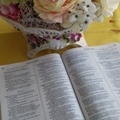[This is one in a series of devotional reflections prepared for Horley Baptist Church during March 2024]
In 1952 the Eurasian author Han Suyin published her semi-autobiographical novel “A Many Splendored Thing”. It describes a romance between two people of different cultures, both of whom had experienced the loss of their previous relationships. The principal male character is separated from his wife, the principal female character is a widow. Although those circumstances are very different, they are both examples of ways in which love has, in practical terms, died.
Some three years after publication the book was made into a film, featuring the title song “Love is a Many-Splendored Thing”. The American singer Don Cornell was one of numerous artists who added it to their repertoires. Curiously, his release was partnered with a ‘B’-side entitled “The Bible Tells Me So”, but it was not the version familiar to generations of Sunday-school children: Jesus loves me, this I know, for the Bible tells me so.
The Bible also tells us that there is another, more positive, way to reflect upon the words of our title:
This is how we know what love is: Jesus Christ laid down his life for us. 1 John 3 v16 [NIVUK]
Jesus Christ, the very embodiment of love, died.
♰
One line from the song declares that “Love is nature’s way of giving a reason to be living” but we would prefer to give the credit elsewhere; not to ‘mother nature’ but rather to Father God “because of his great love for us, [he] made us alive”.[1]
Another line from the song includes the words: “Once on a high and windy hill, in the morning mist“. I doubt that the songwriter was thinking about the first Easter but those words can be an appropriate reminder of the events of that weekend. We each have mental pictures of those events; the first image may well have been influenced by these well-known words:
There is a green hill far away, outside a city wall,
Where the dear Lord was crucified, who died to save us all.
Cecil Frances Alexander (1848)
The second image is that of the discovery of the empty tomb, as reported by Luke and John.[2]
On the first day of the week, very early in the morning, the women came to the tomb, bringing the spices they had prepared.
It was on the first Easter that Love died, it was also when Love triumphed. For the disciples, their life after Easter was never the same. Do those events have the same impact on us?
O Love that wilt not let me go I rest my weary soul in thee.
I give thee back the life I owe, that in thine ocean depths its flow
May richer, fuller be.
George Matheson 1882
Han Suyin’s love did not last, the Love of Jesus cannot cease.
Resources:
[1] Ephesians 2 v4-5
[2] Luke 24 v1, John 20 v1
Bible quotations: Unless otherwise specified, quotations are taken from the resources of Bible Gateway or Bible Hub, in accordance with the licencing conditions outlined on our Site Policies page.
Bible dates:
Where appropriate, the dates given for Biblical events are based on the Bible Timeline resource
and are subject to the constraints defined on the corresponding webpage.
 Horley Baptist Church online
Horley Baptist Church onlineHBC main site
Confidential prayer link
Link to Recent Reflections
Link to Index of Bible Passages
Last week’s reflection: Why?
Contributed by Steve Humphreys; © Steve Humphreys

Thank you Steve for your thoughtful reflection.